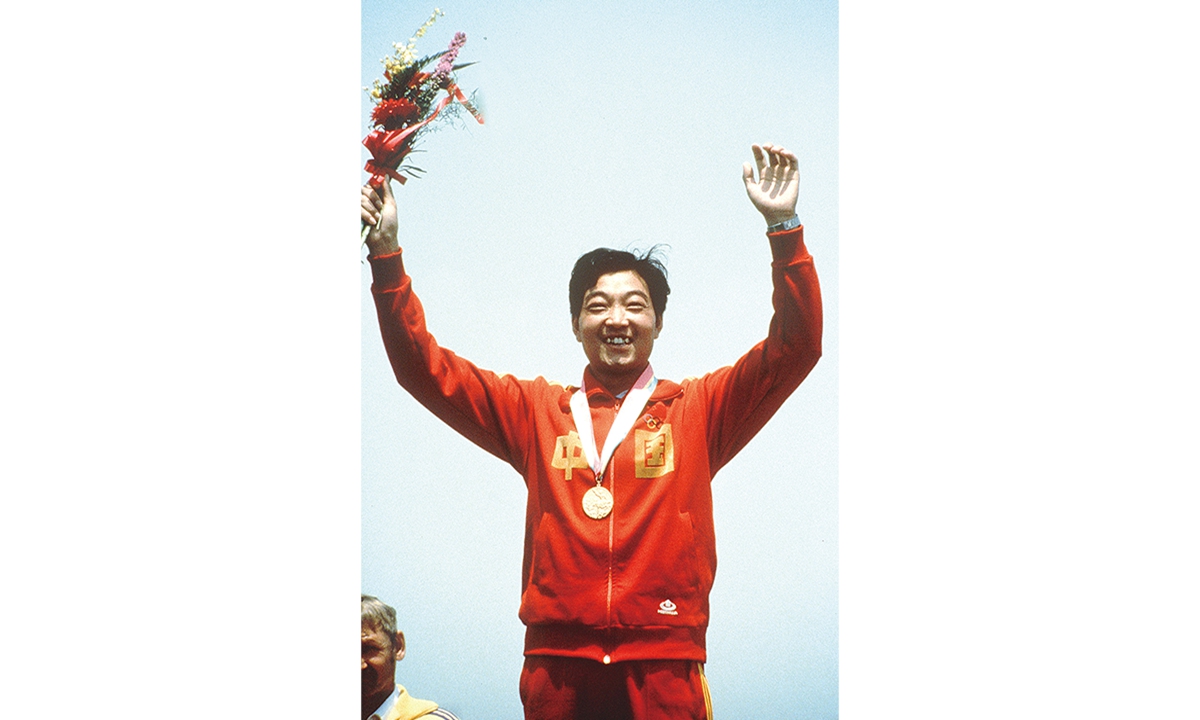In the summer of 1984,mk a young Chinese shooter Xu Haifeng took aim at a target in Los Angeles, the US and forever changed the trajectory of Chinese sports history.
Xu's victory in the men's 50m pistol event earned him the first-ever Olympic gold medal for China, symbolizing the beginning of China's journey toward becoming a dominant force in international athletics.

China's first Olympic gold medalist Xu Haifeng poses with his gold medal after winning the men's pistol event final during the Olympic Games in Los Angeles, the US, on July 29, 1984. Photo: VCG
Over the past four decades, China has transformed from a fledgling participant to a global powerhouse, achieving remarkable feats and fostering a culture of excellence that resonates far beyond the boundaries of sports.
Years of transformation Xu's gold medal was not just a personal triumph but was a national awakening. It signaled that China, despite its relative inexperience in international sports, had the potential to compete at the highest levels. This victory sparked a nationwide interest in athletics and a concerted effort by the government to invest in sports infrastructure and athlete development.
In the late 1980s and throughout the 1990s, China's sports landscape began to transform. The government established specialized training programs, sports schools and academies aimed at identifying and nurturing young talent.
Key figures emerged during this period, such as gymnast Li Ning, who won six medals at the 1984 Los Angeles Games, and the women's volleyball team, whose stellar performances in international competitions won nationwide applause.
However, these years were also marked by significant challenges. Chinese athletes often had limited exposure to international competition, which hindered their ability to compete on a global scale.
The sports infrastructure, although improving, was still in its nascent stages compared with other leading countries in the world. Nevertheless, the determination of Chinese athletes began to shine through, setting the foundation for future successes.
Rise to prominence The turn of the millennium marked a new era of prominence for Chinese sports. The successful bid to host the 2008 Beijing Olympic Games was a pivotal moment for China, reflecting the country's ambition to showcase its cultural and athletic prowess on the world stage.
The years leading up to the 2008 Summer Games had seen unprecedented investment in sports infrastructure and training methodologies, which ultimately resulted to a resounding success for China.
Not only did the country deliver a spectacular opening ceremony that captivated global audiences, but Chinese athletes also dominated the medal tally. China won 48 gold medals, 22 silver, and 30 bronze, totaling 100 medals - an achievement that highlighted its strengths across various disciplines.
The nation's prowess was exemplified by athletes like diver Guo Jingjing, who won two gold medals, and gymnast Zou Kai who secured three golds, showcasing the depth of talent in the Chinese delegation.
This period also saw significant improvements in the scientific approach to sports training in China. The integration of sports science, nutrition and psychology into training regimens contributed to the enhanced performance of Chinese athletes. Additionally, the focus on providing state-of-the-art facilities and comprehensive support systems enabled athletes to reach their full potential.
Following the success of the 2008 Olympic Games, China broadened its focus to include a wider range of sports. The government encouraged participation in less traditional disciplines, leading to breakthroughs in areas such as swimming, athletics and cycling.
This diversification strategy paid off, as evidenced by the stellar performances of athletes like sprinter Su Bingtian. His achievements in sprinting, including becoming the first Asian-born sprinter to break the 10-second barrier in the 100 meters in 2015, though overshadowed by Usain Bolt's dominance, highlighted China's growing athletic prowess.
Chinese athletes continued to excel in their traditionally strong areas as well. Divers Wu Minxia and Chen Ruolin dominated their sport, while paddler Ma Long solidified his legacy in table tennis by becoming one of the few athletes with five Olympic gold medals. These achievements underscored China's sustained excellence in these sports and the effectiveness of its training programs.

Fireworks explode over the National Stadium during the opening ceremony of the Games of the XXIX Olympiad in Beijing, China, on August 8, 2008. Photo: VCG
Expansion to winter sports China's ambition to excel extended beyond summer sports to the winter arena. The successful bid to host the 2022 Winter Olympics in Beijing marked a new chapter in China's sports development. Significant investments were made in winter sports infrastructure, training facilities, and talent development programs, aimed at creating a strong foundation for future success. The 2022 Winter Olympics showcased China's progress in winter sports. Aside from the success of short track speed skating and figure skating, skier Gu Ailing and snowboarder Su Yiming emerged as new stars, winning medals and capturing the world's attention.
The development of winter sports also had a broader impact on Chinese society, promoting a greater interest in skiing, snowboarding and other winter activities among the general population. This shift reflected a growing enthusiasm for sports and physical fitness across the country.
China's journey from Xu's historic gold medal in 1984 to its current status as a global sporting powerhouse is a testament to its unwavering dedication, strategic planning and relentless pursuit of excellence. Over the past 40 years, Chinese athletes have inspired a nation, fostering a culture of pride and achievement in sports.
The transformation of Chinese sports has been mirrored by social changes. Increased public interest and participation in various athletic activities have led to a more health-conscious and active population, to the point that August 8 - the opening day of 2008 Summer Olympics - has been designated as the National Fitness Day.
The legacy of China's Olympic development is not just measured in medals and records but also in the inspiration it provides to future generations. Young people across the country look up to their Olympic heroes, dreaming of one day representing China on the world stage not only in sports.


